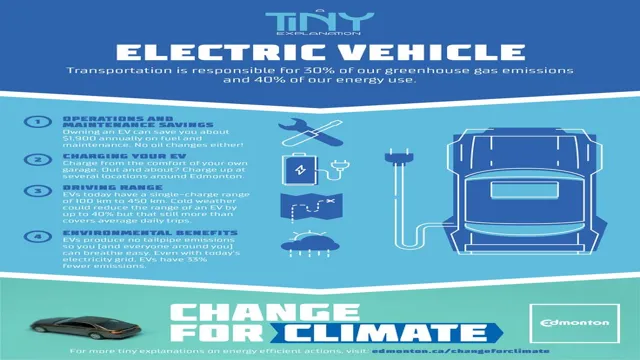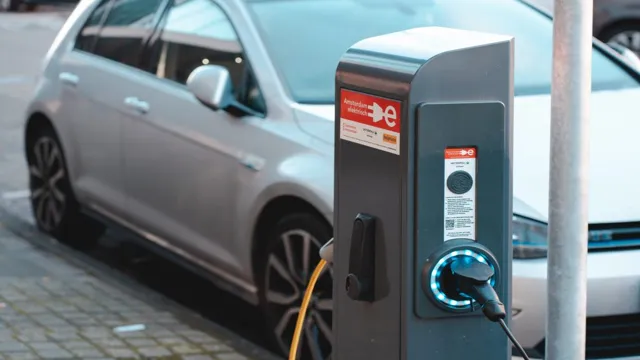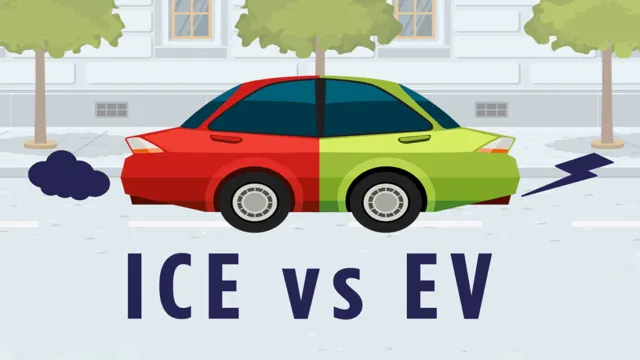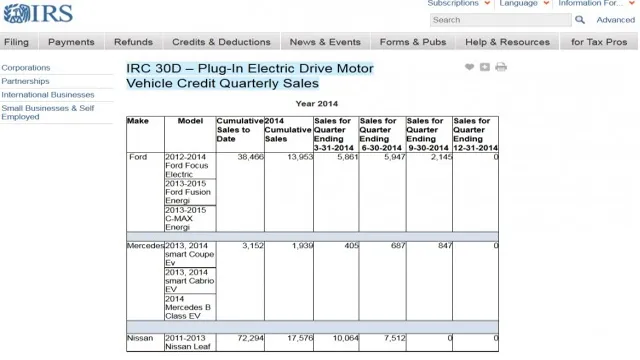Revolutionizing the Automotive Industry: Unveiling Who Benefits From Electric Cars!
Electric cars are not just a technological innovation – they represent a fundamental shift in the way we live our lives. With their ability to reduce greenhouse gas emissions and minimize our reliance on traditional fossil fuels, many see electric cars as the answer to a greener future. But who benefits the most from the rise of electric cars? While the benefits of electric cars are felt by everyone – from individuals to society as a whole – certain groups stand to gain more than others.
In this blog post, we’ll explore who stands to benefit the most from the rise of electric cars, and why. So buckle up and get ready to explore the exciting world of electric cars!
Reduction in Pollution
If you’re looking for a way to reduce your carbon footprint, one option is to switch to an electric car. But who benefits from electric cars beyond just the individual owner? The answer is everyone. By reducing the amount of carbon emissions from transportation, electric cars can help improve air quality and reduce pollution in our communities.
This means that not only will individuals benefit from cleaner air, but also entire cities and regions will see improvements in their environment. In addition, the reduction in pollution can also have positive effects on public health, such as lower rates of respiratory illness and other diseases linked to air pollution. So, while electric cars may seem like a personal choice, they have far-reaching benefits for everyone.
Lower Emissions Improve Public Health and Air Quality
Lower emissions not only help to combat climate change, but they can also have a positive impact on public health and air quality. Air pollution is a major problem in many urban areas, and the emissions from vehicles and factories are a significant contributor to this issue. When emissions are reduced, the levels of harmful particles in the air decrease, which can lead to a range of proven health benefits.
For example, lower levels of air pollution have been linked to a lower risk of heart disease, stroke, and respiratory problems. In addition to these health benefits, improved air quality can also lead to a better quality of life for city residents. People may be able to spend more time outside without worrying about air pollution, and they may be less likely to suffer from headaches, fatigue, or other symptoms associated with poor air quality.
By reducing emissions, we can create a healthier and more livable environment for everyone.
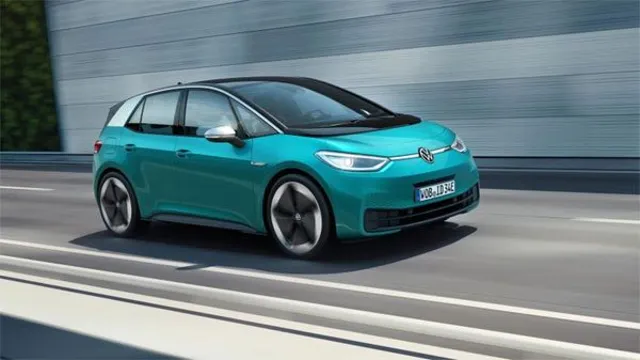
Decrease in Greenhouse Gas Emissions
The decrease in greenhouse gas emissions is a topic that is gaining attention worldwide. It’s no secret that climate change is one of the biggest challenges facing humanity, and reducing pollution is one of the best ways to combat the problem. Thanks to advances in technology and increasing awareness of the issue, there has been a significant decrease in greenhouse gas emissions over the past few years.
This is great news for the environment as it means we are moving in the right direction towards a cleaner, healthier planet. The reduction in pollution is a result of a concerted effort by individuals, governments, and businesses to become more environmentally friendly. We are seeing more renewable energy sources being used, such as solar and wind power, and an increasing number of electric vehicles on our roads.
These solutions are not only helping to reduce pollution, but they are also creating new job opportunities in the green energy sector. The decrease in greenhouse gas emissions is a small step towards a more sustainable future, but it is a step in the right direction.
Cost Savings
Electric cars are becoming increasingly popular due to their potential cost savings. The question many ask is, who really benefits from electric cars? The answer is quite simple; everyone benefits. Not only are electric cars better for the environment, but they also save money on fuel and maintenance costs.
Consumers who switch to electric cars can potentially save thousands of dollars per year, and governments can save on subsidies and incentives for electric vehicles. Additionally, electric cars require less maintenance since they have fewer moving parts compared to traditional gasoline-powered vehicles. This means that industries like transportation, logistics, and delivery can save on maintenance costs in the long run.
Overall, electric cars provide a wide range of benefits that help both individuals and businesses save money. So, it’s no surprise that the demand for electric cars is growing rapidly, and they have become an excellent alternative for those seeking to reduce their expenses.
Reduced Fuel and Maintenance Costs
Reduced Fuel and Maintenance Costs One of the biggest advantages of using new, energy-efficient technologies is the reduced fuel and maintenance costs. As we move towards a more environmentally conscious society, many businesses and consumers alike are looking for ways to reduce their carbon footprint and save money at the same time. By investing in more fuel-efficient vehicles, such as electric or hybrid options, businesses can significantly reduce their fuel expenses over time.
These vehicles may have a higher initial cost but the long-term savings are worth the investment. Additionally, new technologies are designed to minimize maintenance needs, which helps save businesses money on repair costs over the life of the vehicle. The combination of reduced fuel and maintenance costs means businesses can save money and improve their bottom line while also contributing to a cleaner environment.
By adopting new technologies and eco-friendly practices, businesses can stay competitive and thrive in today’s market.
Government Incentives and Tax Credits
If you’re considering going green with your home or business, you’ll be pleased to know that there are government incentives and tax credits available to help offset the costs. These can translate into significant savings for you as a homeowner or business owner, making green energy solutions more accessible and affordable. Depending on where you live, you may be eligible for federal, state, or local incentives, such as rebates, grants, or tax credits.
These incentives can apply to a wide range of green energy solutions, including solar panels, wind turbines, geothermal heating and cooling systems. In addition to these incentives, going green can also lead to long-term savings on utility bills and increased property values. With the right incentives and a commitment to sustainability, going green can be a smart investment for your home or business.
Long-term Financial Benefits for Owners
When it comes to owning a property, it’s important to keep in mind the long-term financial benefits. One of the biggest advantages for owners is cost savings. For example, if you own a home, you’re not subject to rent increases or changes in lease terms.
Additionally, you can deduct mortgage interest and certain expenses on your taxes, which can significantly reduce your tax burden. Over time, you’ll also build equity in your property, which can be used for future investments or expenses. Another cost-saving benefit is that owning a property allows you to make improvements and upgrades that can increase its value, while also enhancing your enjoyment of the home.
Overall, owning a property can provide a sense of financial stability and security, as well as potential long-term gains.
Boost to Local Economy
One of the major beneficiaries of electric cars is the local economy. With an increase in electric car production, there will be a surge in job opportunities, especially in the automobile industry. These job opportunities will range from engineers, researchers, factory workers, and sales representatives, among others.
Additionally, the use of electric vehicles will reduce the dependency on foreign oil, and this will help to strengthen the local economy. Furthermore, electric car owners will save money on gasoline and maintenance costs, which will provide more disposable income for them to spend in their local communities. This increased spending will translate to more sales for local businesses, leading to an overall boost in the local economy.
Therefore, the introduction of electric cars is a win-win for everyone and an excellent way to invigorate the local economy.
Creation of New Jobs in Manufacturing and Maintenance
With the advancement of technology, industries are quickly moving towards automation and digitization. However, this shift has created job uncertainties for many individuals, especially in the manufacturing and maintenance industry. But the good news is that the creation of new jobs in these fields can have a positive impact on the local economy.
The availability of manufacturing and maintenance jobs can boost the local economy by providing opportunities for people to earn a living, pay taxes, and contribute to their communities. This can lead to an increase in consumer spending, which in turn stimulates business growth and creates even more job opportunities. Additionally, the creation of maintenance jobs has the added benefit of extending the lifespan of equipment and facilities, reducing the need for costly replacements.
Overall, the creation of new jobs in manufacturing and maintenance is a win-win situation for both the local economy and the workforce. So, if you’re looking to make a career change, consider exploring the opportunities in these growing industries.
Decrease in Reliance on Foreign Oil
The decrease in our reliance on foreign oil has had a significant positive impact on our local economy. For years, we have been sending billions of dollars overseas to buy oil from other countries, funding their economies at the expense of our own. However, with the increase in domestic oil production, we have been able to keep that money within our borders, creating jobs and helping our own communities thrive.
This boost to our local economies has been felt across the country, from the oil fields in Texas to the refineries in Louisiana. It’s like we have been “feeding two birds with one hand” by decreasing our reliance on foreign oil and boosting our local economy simultaneously. The demand for domestic oil has also led to an increase in the number of businesses that support the industry, further providing employment opportunities for Americans.
All in all, our decreased reliance on foreign oil has proven to be a smart decision both economically and politically.
Future Sustainability
Electric cars are quickly becoming a crucial aspect of our society’s future sustainability, but who benefits the most from this shift? While electric vehicles may seem like a win-win for everyone, certain groups stand to gain the most. For example, those who rely on clean air to breathe, such as people with respiratory issues, are major beneficiaries of the electric car movement. Moreover, electric cars can save their owners a great deal of money on long-term fuel costs.
However, the benefits of electric cars go beyond individual users. They also present an opportunity to reduce our reliance on fossil fuels and move towards a more sustainable approach to transportation. This shift could lead to significant reductions in harmful greenhouse gas emissions and help combat climate change.
Additionally, the implementation of new electric vehicle technology opens up job opportunities in manufacturing, engineering, and other related fields. Overall, electric cars have the potential to benefit individuals, communities, and the planet as a whole.
Reduction in Fossil Fuel Consumption and Dependence
As we move towards a more sustainable future, reducing our dependence on fossil fuels is becoming increasingly important. Not only are these resources finite, but their extraction and consumption also have negative impacts on our environment, including air and water pollution. To achieve a more sustainable world, we need to embrace alternative energy sources, such as solar, wind, and hydro power.
These sources are renewable and produce no emissions, making them a much more environmentally friendly option. By investing in these technologies, we can decrease our reliance on fossil fuels and reduce our carbon footprint. It’s time to look towards the future and move away from our current unsustainable practices.
Are you ready to make the change and embrace sustainable energy practices?
Potential for Renewable Energy Integration and Smart Grid Technology
As the world moves towards a sustainable future, the integration of renewable energy sources and smart grid technology will play a crucial role. The potential for these technologies is immense, and if implemented correctly, could revolutionize the way we consume and generate energy. Renewable energy sources such as wind and solar power have seen massive growth in recent years, with some countries even generating a significant portion of their energy from these sources alone.
However, the biggest challenge facing renewable energy is the intermittency of supply. This is where smart grid technology comes in. By integrating smart grid systems, we can better manage the flow of energy from renewable sources, ensuring a constant and reliable supply.
Ultimately, the integration of renewable energy and smart grid technology offers the potential for a sustainable future, reducing our reliance on fossil fuels and ensuring we leave a cleaner planet for generations to come.
Conclusion
It’s clear that the rise of electric cars benefits everyone, from the environment to individual drivers. Not only do electric cars reduce carbon emissions and promote a more sustainable future, but they also save money on fuel costs and require less maintenance. Plus, let’s not forget the undeniable cool factor of driving a sleek, futuristic car down the street.
So whether you’re an environmentally-conscious activist or a gadget-loving driver, electric cars are the perfect fit for anyone who cares about the planet and wants to enjoy a smooth, stylish ride.”
FAQs
What are the environmental benefits of electric cars?
Electric cars produce zero emissions and reduce air pollution, leading to cleaner air and a healthier environment.
How much money can you save by using an electric car?
Electric cars are more energy-efficient and cost less to operate than gasoline-powered cars, saving you money on fuel and maintenance.
Is there enough infrastructure to support electric cars?
While there is still room for improvement, there are already many charging stations and networks in place to support electric car owners.
What is the driving range of most electric cars?
The driving range of electric cars varies, but most can travel between 100 and 300 miles per charge, making them suitable for everyday driving needs.
Can electric cars be charged at home?
Yes, electric cars can be charged using a home charging station, which is more convenient and cost-effective than relying on public charging stations.
Are there any financial incentives for buying an electric car?
Yes, many states and the federal government offer tax credits and incentives for purchasing an electric car, making them an even more attractive option for eco-conscious consumers.

